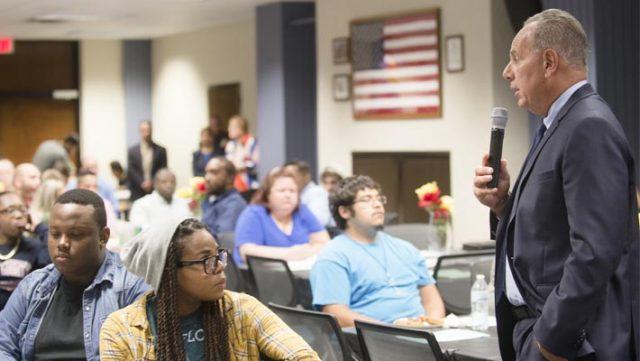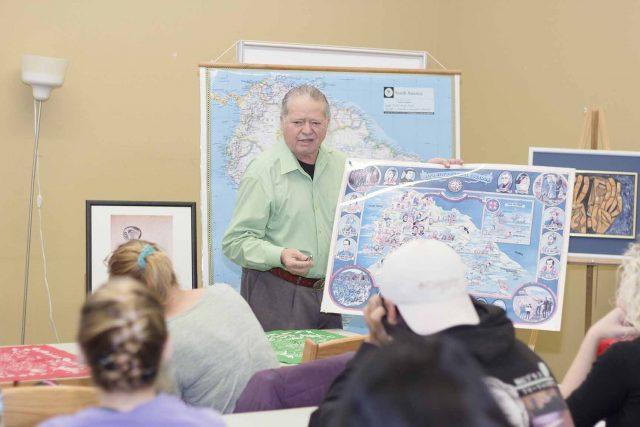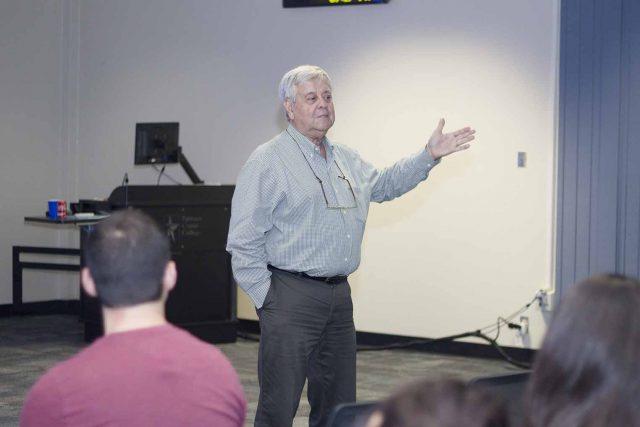By Jamil Oakford/ editor-in-chief

Photos by Bogdan Sierra Miranda/The Collegian
Finding a way to be comfortable in one’s skin is paramount in most people’s lives. Whether it involves tattooing skin or receiving reconstructive surgery to fix what is viewed as a physical flaw, it’s a journey.
And a part of that journey, one that most don’t even consider, is the process of finding out one’s gender. “Am I a woman?” “Am I man?” “Am I both?”
As the topic of gender identity moves into the forefront of many Americans’ minds with discriminatory laws and the transgender community becoming more active and vocal, the different issues surrounding gender identity won’t be going away anytime soon.
“It’s a bigger conversation now,” TCC diversity and inclusion director Andrew Duffield said.
The definition and misuse of the word gender has aided in some of the misunderstanding about gender identity, he said.
“It’s important to understand gender identity because many people don’t understand that sex and gender are different,” South student Roy Rodriguez said.
Duffield explained that gender and sex have been used interchangeably when, in reality, they’re not the same.
“Gender is our social and legal status as girls and boys, women and men,” Duffield said.
Sex is defined as one’s biological and anatomical makeup at birth.
“Gender identity is how you feel about and express your gender,” Duffield said. “Culture determines gender roles and what is masculine and feminine. What does it mean to be a woman or man? Whether we are women or men is not determined just by our sex organs.”
And with gender identity, there comes other categories that people can identify as, including gender fluid, two-spirit or androgynous.
Rodriguez, who is transgender, believes that once people can separate gender and sex, people might come to a new understanding.
“Once this understanding is reached, it’s a lot easier to understand how others feel about it,” he said. “Exploring your gender identity is a great way to eliminate self-doubt.”
Elijah Brewer, a South student who is also transgender, agreed that gender exploration is an important process for anyone.
“I started my journey in high school, freshman year,” he said. “I began to feel like who I was and my body didn’t align.”
A relationship he was in during high school began to help him figure out what he was going through, and he began exploring. But he said these feelings were there, locked away because of the surrounding environment. Coming from a military family, Brewer wasn’t exactly comfortable expressing these thoughts with his family.
For transgender individuals, the strain of wanting to be who they really are and societal gender roles are always a struggle.
“Gender is not only a social construct but also a performativity behavior [that] creates your gender,” Duffield said.
Society helps place clear expectations and ideas for what a boy and a girl or a man and a woman are expected to do. This starts anywhere from how people are expected to dress based on their gender all the way to something as subconscious as mannerisms or the way one walks.
“No one is born knowing how to ‘walk like a man’ or ‘throw like a girl.’ They are taught what that looks like and either embody it or not,” Duffield said.
Rodriguez said for this reason, gender exploration for oneself is vitally important, even if people identify as their biological sex.
“As a transgender individual, once I started exploring myself for what I had known since I was a child, things became much easier to accept,” he said. “It was just who I am, and others are just like me.”
For TCC, conversations about gender identity as it relates to bathrooms are becoming a reality.

Under Title IX, female and LGBTQ+ students are all protected. In May, the U.S. Department of Justice’s Civil Rights division contacted higher education institutions in response to an increasing number of questions filed with its department over the civil rights of transgender students.
The letter reinforced what was already stated in Title IX, asking that schools who provide restrooms and locker rooms provide separate facilities for transgender individuals. And while the schools don’t have to provide completely separate facilities, the college or university must allow students to use the bathroom that aligns with their gender identity.
A lack of compliance or implementation could affect the school’s federal funding.
At TCC, transgender students deal with this problem as well. Brewer said it’s a nerve-wracking experience going into the bathroom.
“I have a lot of anxiety about our breaks and going to the bathroom,” he said. “When there’s a lot of people [in the restroom], it stresses me out. But if there’s a couple of people in there, I’m OK.”
And while the conversation of appropriate facilities continues, at least two campuses have unisex bathrooms. For example, NE Campus has a unisex bathroom in the Fine Arts building but none in the Science building or the Technology and Arts building. The walk to the unisex bathroom can be long and time-consuming if using the gender-specific restrooms isn’t an option.
“I’ve had friends who have had urinary tract infections from holding it in all day,” Brewer said.
But bathrooms aren’t the only issues the transgender community faces. Brewer said that while he’s lived in many different places, when he moved to Texas, he had one major objective.
“One of my big goals was to move out here and start my hormone therapy,” he said.
That is why in October of last year, the best day of his life was getting the go-ahead from his doctor, something he wasn’t so sure he would receive.
“Now that I’ve been on testosterone, it’s been harder to hide this from my family,” Brewer said.
One of the main problems non-binary and transgender individuals face with cisgender, or people whose gender identity lines up with their biological sex, is the lack of knowledge on this subject.
The argument made is that there are so many terms it can get confusing. Within the first Google search on gender identity and the gender spectrum, one finds copious numbers of terms with pronouns many haven’t heard used before. It can be a confusing and challenging undertaking.
Transgender individuals know this and understand that struggle.
“For people who are cisgender, I hope they can be more open about trying to learn and be willing to be corrected,” Brewer said. “I would rather have a cisgender person openly ask me than to be rude about it.”
Brewer, Duffield and Rodriguez agree that educating oneself and asking questions is helpful to the learning process.
And for those who are questioning their gender identity, Brewer said to embrace that journey.
“It’s OK to feel confused or unknown or uncertain about who you are,” he said. “Take your time and search for who you are, even if that takes two years. It’s completely worth it.”



























